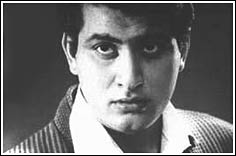
HOME | MOVIES | FEEDBACK |

Dinesh Raheja
Shaheed was Manoj Kumar's first patriotic success. This small-budget black-and-white film had enormous impact, besides laying the foundation for Manoj's famous flag-waving Mr Bharat image that was strengthened by a string of subsequent films like Upkar, Purab Aur Paschim and Kranti.
Though an oft-told story, this 1965 retelling of Bhagat Singh's martyrdom is remembered even today. Shaheed presented nationalist fervour through a deeply human story rooted in emotion.
This biopic begins with a young Bhagat Singh growing up in colonial India pressed under British rule. The bruise of heartache clear in her voice, his staunchly nationalistic mother (Kamini Kaushal) explains to her little boy that the British who had originally come as guests are now hamare desh ke maalik [owners our of country]. The young boy asks pertinently, "Hum bahar kyon nahin nikal dete [Why don't we throw them out]?"
What gave rise to Singh's determination to free India from the shackles of foreign rule is lucidly etched in the film --- he is inspired by his mother and by his freedom fighter uncle who gives up his family life to continue his struggle from outside the country.
His undeniable earnestness (he holds his hand unflinchingly over an open flame) convinces freedom fighter Chandrashekhar Azad to let him join his organisation. Singh teams up with fellow patriots Sukhdev and Rajguru and gets involved in a plot to shoot British officer Scott.
In a tense sequence, with a background score like a pulsating heart, another Britisher, Saunders is assassinated and Singh becomes a fugitive. Donning a Western disguise and enlisting the help of his bhabhi (Nirupa Roy) to pretend she is his wife, Singh makes good his escape.
After he decides to employ the totally nonviolent protest of throwing a bomb (which does not hurt anyone) in Parliament, Singh willingly surrenders to the police. He aims to spread his Inquilab Zindabad message to the masses. Justice, however, is denied him in a keenly contested court case and Singh is sent to jail.
Shaheed very effectively captures the camaraderie between the young freedom fighters --- in the hearty greetings Singh accords to his compatriots in jail. They hail each other with, "Lagta hai barso baad mile hai [It feels like we're meeting after ages],", only to have the jailor retort, "Fiqr mat karo ab barso saath rehna padega [Don't worry, you will stay together for ages]."
That line proves poignantly prescient. The freedom fighters are tortured in jail. Adamantly refusing to submit to subhuman conditions, Singh goes on an affectingly filmed 40-day hunger strike and the jail's inmates follow suit. The case against Singh, Sukhdev and Rajguru ends with a death conviction. And they go to the gallows with their heads held high.
Their unbroken spirit is captured in the snatch of song played much earlier in the film when Singh who is being taken to jail in a jeep crosses paths with Nirupa Roy and her son (representing the nation of the morrow) in a tonga, Hum na dekhenge kal ki subah par tumko dikha jayenge... Mera rang de basanti chola.
Besides the brief interlude with the Jogi song in the inital reels, Shaheed emerges as a tautly paced, well-crafted tribute to a legendary figure and his associates.
The women in the film come off as strong and pragmatic. Despite their own miseries, they don't weaken Bhagat Singh's resolve. Nirupa Roy is particularly adept at mixing emotion with earthy practicality. This glimpse of women power calls to mind the role of countless women in India's freedom struggle.
The pieces seem to fit in naturally into the main story. When Pran makes his entry late in the film, you do wonder at his character's relevance. But Bhagat Singh's ability to inspire his fellow human beings is cogently conveyed through Pran's character who, before being sent to the gallows, says: "Zindagi mein kisi nek aadmi se haath nahin milaya. Milayega haath [I have not shaken hands with a noble man in my life. Will you shake hands with me]?"
Manoj has some well-written dialogue for his own character. When the jailor (Madan Puri) pleads with him to give in, excusing himself by saying, "Main majboor hoon [I am helpless]," Manoj retorts, "Aap hukum se majboor hai [The law makes you helpless]," (pause) "main dil se majboor hoon [my heart makes me helpless]."
The auteur touches are evident in the upside-down framing of the shots when Sukhdev is being tortured, the roti burning unattended on the stove as Singh's mother runs out when she hears of Saunders' assassination and the hooded-eye encounter between Sukhdev and Singh when each is led to believe the other has become a sarkari gawah [government witness].
In the prime of youth and with a palpable desire to leave an impact, a moustache-sporting Manoj gives a memorable performance. The studied mannerisms (a finger on a lip) do make a stray appearance, but Manoj imbues his role with subtle strength of conviction. It is his best performance ever.
Sidelights:
* The film was shot on a tight budget in black-and-white when colour was already predominant. It won three National Awards and was appreciated by then Prime Minister Lal Bahadur Shashtri.
* Two famous villains Pran and Prem Chopra played positive roles in the film. Pran was the leading villain yet did the role for a pittance. When Manoj made his directorial debut with Upkar next, he gave Pran a positive role that changed the course of his career.
* The success of Shaheed enabled 1940s and 1950s star Kamini Kaushal to make a comeback and start a successful second innings in Hindi films, now as a mother.
Music:
* Dhawan distinguished himself with the music of Shaheed. Subsequently, when he composed for an occasional film like Pavitra Paapi, he came up with notable numbers like Teri duniya se hoke majboor chala.
You might also want to read:
|
||||||||
© 1996 - 2002 rediff.com India Limited. All Rights Reserved. |
|||||||||